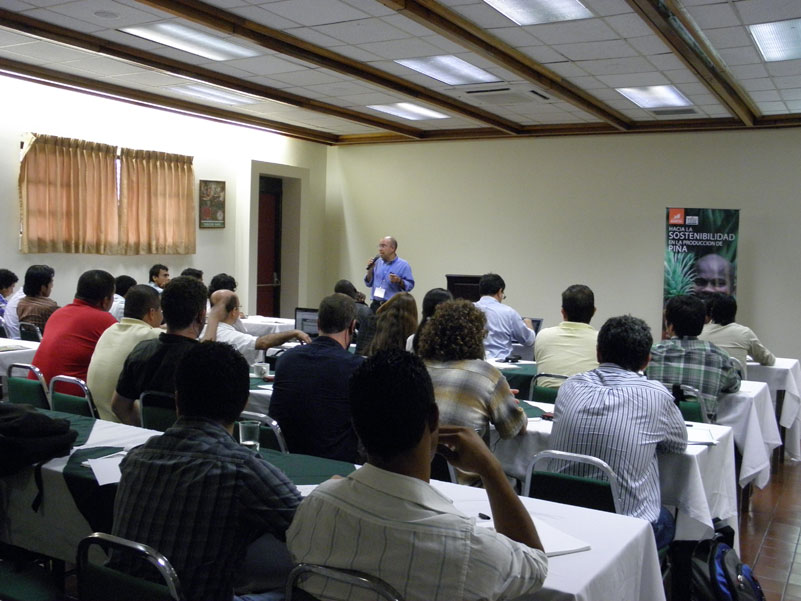EARTH hopes that sharing best practices will lead to greater sustainability in the pineapple sector
In the past 10 years, Costa Rica’s Atlantic coast has slowly seen banana plantations and other farm land and forests replaced by pineapple.
“The first tests for growing pineapple in Costa Rica’s Caribbean lowlands were actually done at EARTH 15 years ago. After that research, several companies started buying tracts of land in the region for pineapple production,” explains Dr. Ramón León, Research Coordinator and Weed Science professor at EARTH University.
Today, Costa Rica is the largest exporter of pineapple in the world, due in part to the growth of the pineapple industry in the Atlantic region. While this boom in pineapple production has undoubtedly had its economic benefits, including for the more than 1,000 small pineapple farmers, it has had negative environmental and social consequences.
About eight years ago, in an effort to promote a more sustainable approach, EARTH gathered government representatives and growers to discuss the issues. However, there was resistance to talking about the problems and the meetings broke down.
Meanwhile, tensions between growers and the surrounding communities continued to escalate resulting in protests that blocked Highway 32, the main transit route between the Port of Limón and San José, garnering national attention.
In response, EARTH coordinated a series of negotiations between government leaders, community representatives and pineapple growers. After two years of talks an agreement was developed; however, at the last minute it faced resistance from important sectors and was never signed.
EARTH provost, Daniel Sherrard remarked, “We had tried to stimulate dialog between different stakeholders and were extremely disappointed when this dialog failed.”
In spite of this setback, EARTH was not ready to give up.
Two years ago, EARTH partnered with Whole Foods Market to strengthen the social and environmental practices of a farm where the supermarket sources pineapple. As part of the partnership, Whole Foods gave EARTH a percent of profits from the sale of the pineapple to promote change in the sector.
When considering how best to readdress this challenge, Ramon notes, “We knew that pineapple growers were not talking to each other; we wanted to encourage the sharing of best practices.”
Dr. León, with the support of research associate Dr. Delaine Kellon, developed and implemented a national survey of pineapple growers in Costa Rica, asking farmers about their overall crop management practices. The study conducted between March and October 2011 surveyed approximately 30 percent of the planted area in the country; making it the largest survey conducted to-date on pineapple farming practices in Costa Rica.
After completing the survey, León and Kellon organized small workshops with growers to review preliminary data and on October 20-21, EARTH and Whole Foods Market held a forum to present the results to small, medium and large growers; government representatives; exporters; buyers; banks; and EARTH students and alumni.
“The survey shows that there is a wide range of variability among how growers are managing their production and there is a lot of opportunity to reduce costs, increase efficiency and improve environmental sustainability,” remarked León.
According to León, the survey also showed that many farms are being innovative, and forest conservation practices are being implemented.
He continued, “We found growers who are achieving high yields with less fertilizer. Many producers didn’t think those kinds of results were possible.”
During the forum, Dr. Kellon also presented the results of the surveys conducted in the communities.
“Communities are open to negotiating and would even be willing to contribute to the cost of monitoring and technical assistance, but they would need to feel sure that this would enable growers to produce pineapple in a more sustainable way,” explained Kellon.
Third-year EARTH student, Pablo Vega (Costa Rica, ’12) was among the forum’s participants. Pablo, whose father owns a pineapple farm in Guatuso in Northern Costa Rica, is currently conducting his three-month internship with the Dole pineapple division at the Piñas del Muelle farm located in Bella Vista de Cutris in San Carlos, Costa Rica.
“From my point of view, this survey is very important because it gives us a sense of what is really happening. This won’t result in immediate change but it’s about raising awareness among producers,” remarked Pablo, who has been promoting conservation practices on his father’s farm.
The final survey results will be published in a peer review journal and available online for public use. León also hopes to find funding to start an inter-institutional program to conduct field days and validate results.
“Now that we have a better idea of what’s possible, we want to work with growers who are doing innovative things and convince them to share their experiences,” and this Ramon says will benefit pineapple growers, the communities that surround them and the planet as a whole.




